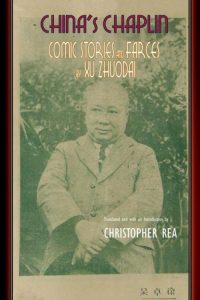Christopher Rea
Research Area
Education
Ph.D., Columbia University, 2008
B.A., Dartmouth College, 1999
About
Christopher Rea is a literary and cultural historian whose research focuses on the modern Chinese-speaking world. My most recent publications concern research methodology, cinema, comedy, celebrities, swindlers, cultural entrepreneurs, and the scholar-writers Qian Zhongshu and Yang Jiang. I am also a translator, including (with Bruce Rusk) of The Book of Swindles and More Swindles from the Late Ming.
At UBC, I am a faculty member and former Associate Head of the Department of Asian Studies; former Director of the Centre for Chinese Research; an associate of the Hong Kong Studies Initiative; and a Faculty Fellow of St. John’s College.
In 2025, The Age of Irreverence celebrates its 10th anniversary with a new paperback edition, and a new annotated Chinese edition of The Book of Swindles was published in Taiwan.
In 2024, The Age of Irreverence arrived in China, Imperfect Understanding was released in paperback, the NEA supported my translation of a novel by Zhang Guixing, and Columbia published More Swindles from the Late Ming.
In 2022, University of Chicago Press published my book with Tom Mullaney, Where Research Begins: Choosing a Research Project That Matters to You (and the World). Editions are available in simplified Chinese, traditional Chinese, Japanese, Korean, Polish, and Thai. Project website.
In 2021, Columbia University Press published my book Chinese Film Classics, 1922-1949. See the online course I created at chinesefilmclassics.org and YouTube playlists of 40+ subtitled early Chinese films and related video lectures.
Explore my free online course on The Modern Chinese Novel.
CONTACT INFORMATION
Department of Asian Studies
UBC Asian Centre
1871 West Mall
Vancouver, BC V6T 1Z2
CANADA
chris [dot] rea [at] ubc [dot] ca
CHINESE FILM CLASSICS
Accompanying my new book are translations of 40+ Chinese films and 22 video lectures, available free at chinesefilmclassics.org. The YouTube channel I host, Modern Chinese Cultural Studies, contains over 250 videos related to Chinese cinema, literature, and modern Chinese culture. Read about the project here, here, and here. Subscribe to be notified of new videos.
NEW BOOKS
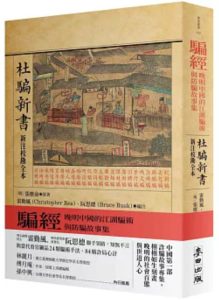







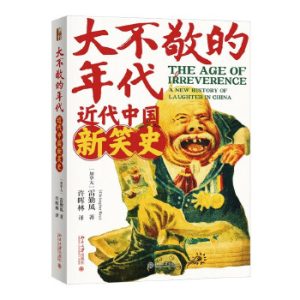



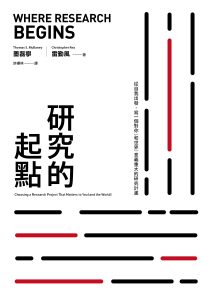



By Thomas S. Mullaney and Christopher Rea. Translated by Hui-Lin Hsu.
Taipei: Rye Field, 2023. Books.com.tw
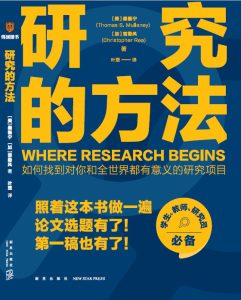



By Thomas S. Mullaney and Christopher Rea. Translated by Ye Su.
Beijing: New Star Press, 2023. Dangdang. Douban.
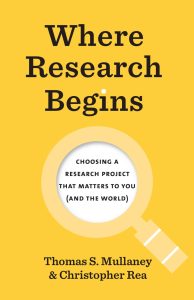



Where Research Begins: Choosing a Research Project That Matters to You (and the World)
By Thomas S. Mullaney and Christopher Rea
Chicago: University of Chicago Press, 2022. Publisher. Amazon. Website. Chronicle Review. Review 2. Podcast 1. Podcast 2. AAS Q&A. Editorial. Simplified Chinese. Traditional Chinese. Japanese. Korean. Polish. Thai. Worksheets.
“Mullaney and Rea have given us a little gem of a book, packed with smart, readable, compassionate guidance on the biggest question: how to start and what to do next. Read it, use it, read it again.” – William Germano
Plenty of books tell you how to do research. This book helps you figure out WHAT to research in the first place, and why it matters.
The hardest part of research isn’t answering a question. It’s knowing what to do before you know what your question is. Where Research Begins tackles the two challenges every researcher faces with every new project: How do I find a compelling problem to investigate—one that truly matters to me, deeply and personally? How do I then design my research project so that the results will matter to anyone else?
This book will help you start your new research project the right way for you with a series of simple yet ingenious exercises. Written in a conversational style and packed with real-world examples, this easy-to-follow workbook offers an engaging guide to finding research inspiration within yourself, and in the broader world of ideas.
Read this book if you (or your students):
- have difficulty choosing a research topic
- know your topic, but are unsure how to turn it into a research project
- feel intimidated by or unqualified to do research
- worry that you’re asking the wrong questions about your research topic
- have plenty of good ideas, but aren’t sure which one to commit to
- feel like your research topic was imposed by someone else
- want to learn new ways to think about how to do research.
Under the expert guidance of award-winning researchers Thomas S. Mullaney and Christopher Rea, you will find yourself on the path to a compelling and meaningful research project, one that matters to you—and the world.
Chinese Film Classics, 1922-1949![]()
![]()
![]()
![]()
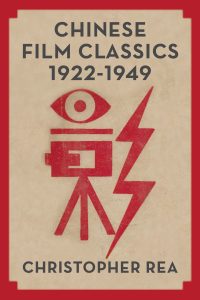



By Christopher Rea
New York: Columbia University Press, 2021. Publisher. Website. Amazon. Trailer. Online course. Subtitled films. Article.
“These films represent for me not just the dawn of Chinese cinema, but also the visualization of my own cultural roots. They vividly established in my imagination the cinematic awakening of ancient China in a rapidly modernizing world. Rea’s sensitive reading of these films is a fascinating and insightful look into this unique cultural touchstone.” — Ang Lee
Chinese Film Classics, 1922–1949 is an essential guide to the first golden age of Chinese cinema. Offering detailed introductions to fourteen films, this study highlights the creative achievements of Chinese filmmakers in the decades leading up to 1949, when the Communists won the civil war and began nationalizing cultural industries.
Christopher Rea reveals the uniqueness and complexity of Republican China’s cinematic masterworks, from the comedies and melodramas of the silent era to talkies and musicals of the 1930s and 1940s. Each chapter appraises the artistry of a single film, highlighting its outstanding formal elements, from cinematography to editing to sound design. Examples include the slapstick gags of Laborer’s Love (1922), Ruan Lingyu’s star turn in Goddess (1934), Zhou Xuan’s mesmerizing performance in Street Angels (1937), Eileen Chang’s urbane comedy of manners Long Live the Missus!(1947), the wartime epic Spring River Flows East (1947), and Fei Mu’s acclaimed work of cinematic lyricism, Spring in a Small Town (1948). Rea shares new insights and archival discoveries about famous films, while explaining their significance in relation to politics, society, and global cinema. Lavishly illustrated and featuring extensive guides to further viewings and readings, Chinese Film Classics, 1922–1949 offers an accessible tour of China’s early contributions to the cinematic arts.
China’s Chaplin: Comic Stories and Farces by Xu Zhuodai
Translated and with an introduction by Christopher Rea
Ithaca, NY: Cornell East Asia Series, 2019. Publisher. Amazon. Podcast.
Hoaxes! Jokes! Farces and fun! China’s Chaplin introduces the imagination of Xu Zhuodai (1880–1958), a comic dynamo who made Shanghai laugh through the tumultuous decades of the pre-Mao era. Xu was a popular and prolific literary humorist who styled himself variously as Master of the Broken Chamberpot Studio, Dr. Split-Crotch Pants, Dr. Hairy Li, and Old Man Soy Sauce. He was also an entrepreneur who founded gymnastics academies, theater troupes, film companies, magazines, and a home condiments business.
China’s Chaplin contains a selection of Xu’s best stories and stage plays (plus a smattering of jokes) that will answer the questions that keep you up at night. What is a father’s duty when he and his son are courting the same prostitute? What ingenious method might save the world from economic crisis after a world war? Who is Shanghai’s most outrageous grandmother? What is the best revenge against plagiarists, thieves, landlords, or spouses? And why should you never, never, never pull a hair from a horse’s tail?




By Lei Qinfeng (Christopher Rea); translated by Hui-Lin Hsu. Publisher. Books.com.tw. Review 1. Review 2. Excerpt. Radio feature.
Taipei, Taiwan: Rye Field, 2018.
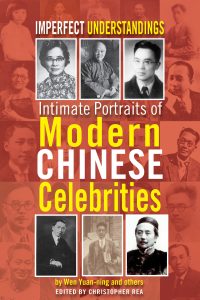



By Wen Yuan-ning and others; edited by Christopher Rea
Amherst, NY: Cambria Press, 2018. Publisher. Amazon. Q&A. MCLC review.
Wen Yuan-ning (1900-1984) was both an insider and an outsider on the politics of celebrity in modern China. Born into a Hakka family in the Dutch East Indies, he studied law at Cambridge University before moving to China to embark on a remarkably varied career. He taught English literature at China’s top universities, including Peking and Tsinghua, contributed to leading English-language periodicals such as The China Critic and T’ien Hsia Monthly, served in China’s legislature in Nanking, worked as a wartime propagandist in Hong Kong, and eventually was appointed as China’s ambassador to Greece.
During the heady days of Anglophone publishing in 1930s China, Wen Yuan-ning edited for the Critic a series of “Unedited Biographies” (later “Intimate Portraits”) of famous contemporary Chinese personages. Wen and his collaborators—some of whom wrote anonymously—offered readers mischievous and idiosyncratic accounts of the careers and personalities of the people in the news. These celebrity sketches proved both controversial and popular, with several of them immediately being translated into Chinese. A selection of seventeen of Wen’s own contributions to the Critic series was published to acclaim in 1935 as the book Imperfect Understanding. Yet Wen and his contributions to Chinese literary culture disappeared from the historical record after the founding of the People’s Republic, likely because Wen wrote in English and had close ties to the Chinese Nationalist Party.
Imperfect Understanding is both an entertaining work of literature, by turns comedic and touching, and an important historical document. Its fifty sketches represent influential Chinese historical figures warts and all, in the eyes of contemporary observers seeking to provide readers an alternative to the autobiographical puffery of popular books like Who’s Who in China. Christopher Rea’s introduction offers new research on the forgotten literary figure Wen Yuan-ning and argues that one of the essays published under his name was written anonymously by a young man who went on to become one of modern China’s literary giants: Qian Zhongshu. This edition of Imperfect Understanding also includes multiple reviews of Wen’s book, brief biographies of the subjects of the Critic series, and a bibliography of further writings by and on Wen Yuan-ning.




By Zhang Yingyu (fl. 1600s), translated by Christopher Rea and Bruce Rusk.
New York, NY: Columbia University Press, 2017. Publisher. Amazon. Ming dynasty edition. Sample story 1. Sample story 2. Q&A. Review 1. MCLC Review. Sinica Podcast interview. Audio interview. Video introduction.
“What’s the oldest scam in the book? Nobody knows, but at least we have the oldest book about scams in China. It’s called The Book of Swindles, and finally, after four hundred years, Rea and Rusk have presented us with a vivid and entertaining new translation of this classic. Even the chapter titles—’Eating Human Fetuses to Fake Fasting’; ‘Swindling the Salt Commissioner While Disguised as Daoists’—are as priceless as anything else produced during the Ming dynasty.” — Peter Hessler
This is an age of deception. Con men ply the roadways. Bogus alchemists pretend to turn one piece of silver into three. Devious nuns entice young women into adultery. Sorcerers use charmed talismans for mind control and murder. A pair of dubious monks extorts money from a powerful official and then spends it on whoring. A rich student tries to bribe the chief examiner, only to hand his money to an imposter. A eunuch kidnaps boys and consumes their “essence” in an attempt to regrow his penis. These are just a few of the entertaining and surprising tales to be found in this seventeenth-century work, said to be the earliest Chinese collection of swindle stories.
The Book of Swindles, compiled by an obscure writer from southern China, presents a fascinating tableau of criminal ingenuity. The flourishing economy of the late Ming period created overnight fortunes for merchants—and gave rise to a host of smooth operators, charlatans, forgers, and imposters seeking to siphon off some of the new wealth. The Book of Swindles, which was ostensibly written as a manual for self-protection in this shifting and unstable world, also offers an expert guide to the art of deception. Each story comes with commentary by the author, Zhang Yingyu, who expounds a moral lesson while also speaking as a connoisseur of the swindle. This volume, which contains annotated translations of just over half of the eighty-odd stories in Zhang’s original collection, provides a wealth of detail on social life during the late Ming and offers words of warning for a world in peril.




By Christopher Rea
Oakland, CA: University of California Press, 2015. Publisher. Paperback. Amazon. E-book. Kindle. Author Q&A. New York Times. Rorotoko. MCLC review. Video (6 min). Read excerpts here and here.
Winner of the 2017 Joseph Levenson Book Prize (Post-1900 China), awarded by the Association for Asian Studies.
“I am confident that it is the finest in its field to include a lyric by me.” — Eric Idle
The Age of Irreverence tells the story of why China’s entry into the modern age was not just traumatic, but uproarious. As the Qing dynasty slumped toward extinction, prominent writers compiled jokes into collections they called “histories of laughter.” In the first years of the Republic, novelists, essayists and illustrators alike used humorous allegories to make veiled critiques of the new government. But, again and again, political and cultural discussion erupted into invective, as critics gleefully jeered and derided rivals in public. Farceurs drew followings in the popular press, promoting a culture of practical joking and buffoonery. Eventually, these various expressions of hilarity proved so offensive to high-brow writers that they launched a concerted campaign to transform the tone of public discourse, hoping to displace the old forms of mirth with a new one they called youmo (humor).
Christopher Rea argues that this period—from the 1890s to the 1930s—transformed how Chinese people thought and talked about what is funny. Focusing on five cultural expressions of laughter—jokes, play, mockery, farce, and humor—he reveals the textures of comedy that were a part of everyday life during modern China’s first “age of irreverence.” This new history of laughter not only offers an unprecedented and up-close look at a neglected facet of Chinese cultural modernity, but also reveals its lasting legacy in the Chinese language of the comic today and its implications for our understanding of humor as a part of human culture.
Here’s a brief video interview about the book with ChinaFile.
A few bonus visuals appear in this discussion (part 1 of 3) of Chinese laughter between me and Henry Jenkins. Watch a video of us talking about “The Ancient Art of Falling Down: Vaudeville Cinema between Hollywood and China” or read the transcript, with images and film clips.




Edited by Christopher Rea and Nicolai Volland
Vancouver, BC: UBC Press, 2015; Hong Kong: Hong Kong University Press, 2015. Sample chapter (PDF). Google Books preview (HTML).
From the late nineteenth- to the mid-twentieth century, changes in mass media, transportation, and communication technologies provided unprecedented opportunities for the entrepreneurially-minded in China and Southeast Asia.
The Business of Culture examines the rise of these “cultural entrepreneurs,” Chinese business people who risked financial well-being and reputation by investing in multiple enterprises to build cultural, social, or financial capital. Featuring ten interlinked case studies, this volume introduces readers to three distinct archetypes who emerged during this time: the cultural personality, the tycoon, and collective enterprise. These include the likes of Lü Bicheng, a famous classical poet, who parlayed her literary prestige into a career as the principal of a Beijing girls’ school and then used her business fortune to build a high-profile persona as a glamorous foreign correspondent; Aw Boon Haw, the “tiger” behind the Tiger Brand pharmaceutical company; and the Shaw Brothers, ethnic Chinese filmmakers and exhibitors who drew thousands of people out each night to watch movies in Singapore and British Malaya. Collectively, these portraits reveal how changes in social and economic conditions created the fertile soil for business success–conditions similar to those emerging in China today.
Teaching
Research
CURRENT PROJECTS
China on the Make: Stories of Chinese Deception. A history of how and why deception has been such a dominant theme in Chinese storytelling traditions, and in stories circulating worldwide about Chinese culture.
The Unfinished Comedy. A sequel to The Age of Irreverence, discussing how Chinese comic culture changed from the 1930s through the Anti-Japanese War, the Chinese Civil War, and into the early years of the People’s Republic.
RESEARCH INTERESTS
Modern Chinese literature and drama
Late Qing (1895-1911) and Republican era (1912-1949) print culture
Cinema and film history (website)
Research methodology
Cartoons, manhua, and visual culture
Translation
Cultures of comedy and laughter (read/watch “The Ancient Art of Falling Down“)
Stories of swindles, fraud, and deception
Qian Zhongshu and Yang Jiang (video introduction to both authors)
CHINESE STUDIES WEB RESOURCES
UBC Department of Asian Studies
UBC Centre for Chinese Research
Modern Chinese Literature and Culture Resource Center at The Ohio State University
Chinese Text Project (ctext.org), open-access repository of pre-modern Chinese texts
Scripta Sinica (searchable full-text Chinese classics and histories) at Academia Sinica, Taiwan
Heidelberg Digital Archive for Chinese Studies (must request password, no charge)
Chinese Language Dictionary, R.O.C. Ministry of Education
Zdic.net Chinese language etymological dictionary
Lin Yutang Chinese-English Dictionary of Modern Usage
Paper Republic: Chinese Literature in Translation
CHINESE STUDIES LIBRARY CATALOGUES
UBC: www.library.ubc.ca
Harvard: lib.harvard.edu
Columbia: www.columbia.edu/cu/lweb/
UC Berkeley & UC system: www.lib.berkeley.edu
Academia Sinica: las.sinica.edu.tw/*cht
PRC National Library: www.nlc.gov.cn/GB/channel1/index.html
Taiwan National Library: www.ncl.edu.tw/mp.asp
Shanghai Library: www.library.sh.cn
Publications
BOOKS
Zhang Yingyu. Pian jing: Wan Ming Zhongguo de jianghu pianshu yu fangpian gushi ji (The Book of Swindles: A Collection of Stories about Scams and How to Foil Them from Late Ming China). Edited by Christopher Rea and Bruce Rusk. Taipei: Rye Field, 2025.
Where Research Begins: Choosing a Research Project That Matters to You (and the World)
By Thomas S. Mullaney and Christopher Rea
Chicago: University of Chicago Press, 2022. Publisher. Amazon. Website. Review. Interview. Simplified Chinese. Traditional Chinese. Japanese. Korean. Polish. Thai. Worksheets.
Chinese Film Classics, 1922-1949
By Christopher Rea
New York: Columbia University Press, May 2021. Publisher. Website. Amazon. Trailer. Online course. Subtitled films.
China’s Chaplin: Comic Stories and Farces by Xu Zhuodai
Translated and with an introduction by Christopher Rea
Ithaca, NY: Cornell East Asia Series, 2019. Publisher. Amazon. Podcast.
Da bujing de niandai: Jindai Zhongguo xin xiaoshi (The Age of Irreverence: A New History of Laughter in China).
By Lei Qinfeng (Christopher Rea); translated by Hui-Lin Hsu. Publisher. Books.com.tw. Review 1. Review 2. Excerpt. Radio feature.
Taipei, Taiwan: Rye Field, 2018.
Beijing: Peking University Press, 2024.
Imperfect Understanding: Intimate Portraits of Chinese Celebrities
By Wen Yuan-ning and others; edited by Christopher Rea
Amherst, NY: Cambria Press, 2018. Publisher. Amazon. Q&A. MCLC review. CRI review.
The Book of Swindles: Selections from a Late Ming Collection.
By Zhang Yingyu (fl. 1600s); translated by Christopher Rea and Bruce Rusk.
New York, NY: Columbia University Press, 2017. Publisher. Amazon. Ming dynasty edition. Sample story 1. Sample story 2. Q&A. Review. MCLC Review. Sinica Podcast interview. Audio interview. Video introduction.
The Age of Irreverence: A New History of Laughter in China
By Christopher Rea
Oakland, CA: University of California Press, 2015. Levenson Prize. Publisher; Amazon. E-book. Kindle. Author Q&A. Illustrated Q&A. New York Times. Rorotoko. MCLC review. Audio interview (68 mins). Video interview (6 mins). Read excerpts here and here (HTML).
China’s Literary Cosmopolitans: Qian Zhongshu, Yang Jiang and the World of Letters.
Edited by Christopher Rea
Leiden and Boston: Brill, 2015.
The Business of Culture: Cultural Entrepreneurs in China and Southeast Asia, 1900-65.
Edited by Christopher Rea and Nicolai Volland
Vancouver, BC: UBC Press, 2015; Hong Kong: Hong Kong University Press, 2015. Introduction (PDF).




Humans, Beasts, and Ghosts: Stories and Essays by Qian Zhongshu.
Edited by Christopher G. Rea
New York: Columbia University Press, 2011. Read the first story (HTML). Chinese introduction (PDF).
(A collection of translated essays and short stories from Xie zai rensheng bianshang (1941) and Ren, shou, gui(1946), with a critical introduction. Here’s a video introduction to the book.)
EDITED JOURNAL ISSUES
William Sima and Christopher G. Rea, eds. “Focus on The China Critic (Zhongguo pinglun zhoubao).” A combined issue of China Heritage Quarterly, nos. 30/31 (June/September 2012). Link to full issue (HTML).








Link to introduction (PDF) and abstracts (HTML)
JOURNAL ARTICLES
“Love and Duty: Translating Films and Teaching Online through a Pandemic,” Global Storytelling: Journal of Digital and Moving Images 1:2 (Winter 2021): 3-19. PDF (open access)
“New Online Teaching Resources for Early Chinese Cinema,” Education About Asia 26:2 (Fall 2021): 18-22. HTML and PDF (open access)
“Hoax as Method.” Prism: Theory and Modern Chinese Literature, vol. 16, no. 2 (fall 2019): 236-259.
(with Henry Jenkins). “The Ancient Art of Falling Down: Vaudeville Cinema between Hollywood and China,” MCLC Resource Centre Publications (Aug. 2017). Article (HTML). Article (PDF)
“The ‘Critic Eye’ of Qian Zhongshu,” Chinese Arts & Letters 2:2 (Oct. 2015), pp. 98-118. Article (PDF)
“Great Books and Free Wine” (in memory of C.T. Hsia), Chinese Literature Today 4:1 (2014). Article (HTML)
“The Critic at Large.” China Heritage Quarterly, 30/31 (June/Sept. 2012). Article (HTML)
“‘The Critic Eye (piyan)’.” China Heritage Quarterly, 30/31. Article (HTML)
“On Lun.” China Heritage Quarterly, 30/31. Article (HTML)
“‘To Thine Own Self Be True’: One Hundred Years of Yang Jiang.” Renditions, no. 76 (Fall 2011), pp. 7-14.
“Yang Jiang’s Conspicuous Inconspicuousness: A Centenary Writer in China’s ‘Prosperous Age.’” China Heritage Quarterly, 26 (June 2011). Article (HTML)
(with Nicolai Volland). “Comic Visions of Modern China: Introduction.” Modern Chinese Literature and Culture, 20: 2 (Fall 2008), pp. v-xviii. Article (PDF)
“Comedy and Cultural Entrepreneurship in Xu Zhuodai’s Huaji Shanghai.” Modern Chinese Literature and Culture, 20:2 (Fall 2008), pp. 40-91. Abstract (HTML). Article (PDF)
“‘I Envy You Your New Teeth and Hair’: Humor, Self-Awareness, and Du Fu’s Poetic Self-Image.” T’ang Studies, No. 23/24 (2005-2006), pp. 47-89. Article (PDF).




BOOK CHAPTERS
“Introduction: ‘Charlie Chaplin of the East’, Xu Zhuodai,” in China’s Chaplin, pp. 1-29.
“Introduction: Intimate Portraits of Chinese Celebrities,” in Imperfect Understanding, pp. 1-31.
(with Bruce Rusk) “Translators’ Introduction,” in The Book of Swindles, pp. xiii-xxxvi.
“Wenhua qiyejia xinlun” (A New Theory of the Cultural Entrepreneur). Translated [from “Enter the Cultural Entrepreneur”] by Xu Shiyan. Nanfang wentan (Southern Cultural Forum) no. 191 (15 July 2019).
“Toppling Liu Xiaobo.” In Jane Golley and Linda Jaivin, eds. The China Story Yearbook 2017: Prosperity. Canberra: ANU Press, 2018, pp. 25-28.
“Qian Zhongshu and Yang Jiang: A Literary Marriage.” In The Columbia Companion to Modern Chinese Literature. Kirk A. Denton, ed. New York: Columbia University Press, 2016, pp. 231-236. Article (PDF)
“Introduction: All the World’s a Book.” In China’s Literary Cosmopolitans, pp. 1-13.
“The Institutional Mindset: Qian Zhongshu and Yang Jiang on Marriage and the Academy.” In China’s Literary Cosmopolitans, pp. 157-178.
“All Will Come Out in the Washing.” In China’s Literary Cosmopolitans, pp. 227-231.
(with Nicolai Volland). “Introduction.” In The Business of Culture, pp. 3-8. Full text (PDF).
“Enter the Cultural Entrepreneur.” In The Business of Culture, pp. 9-31. Full text (PDF).
(with Sai-Shing Yung). “One Chicken, Three Dishes: The Cultural Enterprises of Law Bun.” In The Business ofCulture, pp. 150-177. Full text (PDF)
“Tianxia you zei: Mingdai ‘pianjing’ ‘Dupian xinshu’” (World of Thieves: The Ming Dynasty Swindling Classic “A New Book for Foiling Swindles”). In Cong Moluo dao Nuobei’er: Wenxue, jingdian, xiandai yishi (From Mara Poetry to the Nobel Prize: Literary Classics and Modern Consciousness). Ko Chia cian and Cheng Yu-yu, eds. Taipei: Rye Field, 2015, pp. 304-317. Full text (PDF)




“Spoofing (e’gao) Culture on the Chinese Internet.”In Humour in Chinese Life and Culture: Resistance and Control in Modern Times. Jessica Milner Davis and Jocelyn Chey, eds. Hong Kong: Hong Kong University Press, 2013, pp. 149-172. Publisher’s description (HTML). Chapter (PDF).
“Foreword.” Twelve Towers: Short Stories by Li Yu, bilingual edition. Retold by Nathan Mao and Weiting R. Mao. Beijing: Foreign Language Research and Teaching Press, 2011, pp. 1-6. Preview (HTML). Chapter (PDF)












SHORTER TRANSLATIONS
Lee Kuo-Hsiu. Shamlet (Shamuleite [stage play]). Sinophone Adaptations of Shakespeare: An Anthology, 1987-2007. Alexa Alice Joubin, ed. Springer, 2022.
Xu Zhuodai. “Marvelous Soy Sauce!” Translating the Occupation: The Japanese Invasion of China, 1931-45. Jonathan Henshaw, Craig A. Smith, Norman Smith, eds. Vancouver: UBC Press, forthcoming 2020.
Crows and Sparrows (Wuya yu maque, 1949), directed by Zheng Junli. MCLC Online Publications (April 2020). Subtitled film and script (HTML).
Long Live the Missus! (Taitai wansui, 1947), directed by Sang Hu; screenplay by Eileen Chang. MCLC Online Publications (May 2019). Subtitled film and script (HTML).
Xu Zhuodai. “Opening Day Advertisement.” Renditions, no. 87 & 88 (Spring/Autumn 2017), pp. 192-202 (with “Introduction to Xu Zhuodai” on pp. 189-191). Issue contents (HTML).
Essays by Huang Chunming, Wang Zhenhe, and Zhong Mingde. In: The Columbia Sourcebook of Literary Taiwan. Sung-sheng Yvonne Chang, Michelle Yeh, and Ming-ju Fan, eds. New York: Columbia University Press, 2014.
Xu Zhuodai. “The Secret Room.” Renditions, no. 77 & 78 (Spring/Autumn 2012), pp. 78-86. Issue contents(HTML). Full text (PDF).
Zhang Letian. “Consuming the Absurd: Satire and Humour in Contemporary Chinese Art.” Go Figure!: Contemporary Chinese Art. Claire Roberts, ed. Canberra: National Portrait Gallery of Australia, 2012, pp. 58-70.Book description (HTML). Full text (PDF).
Yang Jiang. “Heart’s Desire: Act I.” Renditions, no. 76 (Autumn 2011), pp. 15-33. Excerpt (HTML). Full text (PDF).
Yang Jiang. “What a Joke.” Renditions, no. 76 (Autumn 2011), pp. 34-67. Issue contents (HTML). Full text (PDF).
Ding Xilin. “Three Dollars in National Currency: A One-Act Comedy by Ding Xilin,” with critical introduction. Asian Theatre Journal, Vol. 25, no. 2 (Fall 2008), pp. 173-192. Full text (PDF)




BOOK REVIEWS
“When Fish Were Fish.” Review of Hans Georg-Moeller and Paul J. D’Ambrosio’s Genuine Pretending: On the Philosophy of the Zhuangzi. China Review International 25:1 (2018) (published in Feb. 2020): 1-7.
“Hong Kong on the Brain.” Review of Hon Lai-chu. The Kite Family. Translated by Andrea Lingenfelter. Hong Kong: East Slope, 2016. Los Angeles Review of Books China channel, 11 December 2017.
Pi-Ching Hsu. “Feng Menglong’s Treasury of Laughs: A Seventeenth-Century Anthology of Chinese Humour.” Ming Studies 76 (Oct. 2017): 107-109.
“Shanghailanders: A look back at the myth of salacious Shanghai.” Review of Taras Grescoe. Shanghai Grand: Forbidden Love and International Intrigue on the Eve of the Second World War. Toronto: HarperAvenue, 2016. Literary Review of Canada, July/August 2016. Review (PDF)
Yu Hua. Brothers: A Novel. Tr. Eileen Cheng-yin Chow and Carlos Rojas. New York: Pantheon, 2009. Modern Chinese Literature and Culture Resource Centre (online), October 2011. Review (PDF). Review (HTML). Chinese version (PDF).
Alexander Huang. Chinese Shakespeares: Two Centuries of Cultural Exchange. New York: Columbia University Press, 2009. China Review International, 16:4 (2009), pp. 521-526. Review (PDF)
GENERAL MEDIA / BLOG
“Animation and the Republican Chinese Film Industry,” Association for Chinese Animation Studies website (1 Oct. 2021). Article (HTML).
“From the Year of the Ape to the Year of the Monkey,” The China Story (2 Mar. 2016). Article (HTML). Article (PDF)
“Spawn of China’s One-Child Policy,” Asia Pacific Memo (5 Nov. 2015). Article (HTML)
“Idle Words on C.T. Hsia’s A History of Modern Chinese Fiction (in Chinese). Article (PDF)
“Mo Yan’s Nobel Prize in Literature,” Asia Pacific Memo (15 Oct. 2012). Article (HTML)
“China ‘vindicated’ by Mo Yan’s Nobel literature prize,” Radio Australia (12 Oct. 2012). Interview (MP3, HTML)
(with Ji Jin). “Qian Zhongshu yu Yang Jiang toushi” (New perspectives on Qian Zhongshu and Yang Jiang), Mingpao Monthly (1 Mar. 2011). Article (HTML) (in Chinese)
“China’s Nobel Prize Complex, circa 1946,” Toronto Star (10 Dec. 2010). Article (HTML). Article (PDF)
“‘Life, it’s been said, is one big book…’: One hundred years of Qian Zhongshu,” The China Beat (21 Nov. 2010). Article (PDF). Chinese version (HTML)
“An Interview with David Der-wei Wang” (2007) (in Chinese). Full text (PDF)
Awards
National Endowment for the Arts Translation Fellowship, 2024
UBC Dean of Arts Mentorship Award, 2024
UBC Killam Research Prize, 2022
UBC Public Engagement Award, 2022
Chiang Ching-kuo Foundation Scholar Grant, 2020-21
Joseph Levenson Book Prize (Post-1900 China), Association for Asian Studies, 2017
SSHRC Insight Grant, 2016-21
Visiting Fellow, Institute of Chinese Literature and Philosophy, Academia Sinica, 2014-15
ANU Australian Centre on China in the World Postdoctoral Fellowship, 2012
SSHRC Standard Research Grant, 2010-13
Chiang Ching-kuo Foundation Workshop Grant, 2010
Hampton Research Fund Grant, UBC, 2009-11
Peter Wall Institute for Advanced Studies Early Career Scholar, UBC, 2009-10
ACLS/CCK “New Perspectives on Chinese Culture and Society” Grant, 2009
Visiting Fellowship, Harvard University, 2006-08
Whiting Foundation Dissertation Completion Fellowship (declined), 2007-08
Chiang Ching-kuo Foundation Doctoral Fellowship, 2007-08
Faculty Fellowship, Columbia University, 2002-07
Weatherhead Institute Ph.D. Training Grant, Columbia University, 2003, 2006
Fulbright Scholar (Taiwan), 2004-05
Foreign Languages and Area Studies (FLAS) Fellowship, Columbia University, 2002-03
Graduate Supervision
PROSPECTIVE GRADUATE STUDENTS
I welcome inquiries from prospective MA and PhD students interested in conducting research on modern Chinese literature, cinema, and culture. When writing, please include a brief summary of your research interests, academic background (including your proficiency in Chinese and other languages), and why you are interested in studying at UBC. Please do not include attachments.
Do read about why I advise students never to “narrow down” a research topic.
CURRENT PhD STUDENTS
HE Yimeng
YAO Jiaqi
CURRENT MA STUDENTS
MAHMOODI, Farimah
SONG, Siyu
STRUM, Molly
TANG, Pingting
TEH, Jeffrey
Academic Activities
VIDEOS AND MEDIA
Watch the 40+ translated Chinese films and 22 related video lectures at chinesefilmclassics.org and on the YouTube channel Modern Chinese Cultural Studies.
Chinese Film Classics (Chinese films with English subtitles)
Laborer’s Love (Zhang Shichuan, dir., 1922)
Love and Duty (Richard Poh, dir., 1931)
The Peach Girl (Richard Poh, dir., 1931)
Spring Silkworms (Cheng Bugao, dir., 1931)
Playthings (Sun Yu, dir., 1933)
Daybreak (Sun Yu, dir., 1933)
Song of the Fishermen (Cai Chusheng, dir., 1934)
Sports Queen (Sun Yu, dir., 1934)
Goddess (Wu Yonggang, dir., 1934)
The Great Road (Sun Yu, dir., 1934)
Song of China (Fei Mu, dir., 1935)
City Scenes (Yuan Muzhi, dir., 1935)
New Women (Cai Chusheng, dir., 1935) (translated by Eileen Cheng-yin Chow)
Song at Midnight (Ma-Xu Weibang, dir., 1937)
Street Angels (Yuan Muzhi, dir., 1937)
Hua Mu Lan (Richard Poh, dir., 1939)
Princess Iron Fan (Wan brothers, dirs., 1941)
Love Everlasting (Sang Hu, dir., 1947)
Long Live the Missus! (Sang Hu, dir., 1947)
Spring River Flows East (part 1) (part 2) (Cai Chusheng and Zheng Junli, dirs., 1947)
Spring in a Small Town (Fei Mu, dir., 1948)
Wanderings of Three-Hairs the Orphan (Zhao Ming and Yan Gong, dirs., 1949)
Crows and Sparrows (Zheng Junli, dir., 1949)
Lectures and Events
“How Bruce Lee Became a Legend, Part 1: What Made Bruce Lee Different?” (VPL, 2 Dec. 2020)
“How Bruce Lee Became a Legend, Part 2: The African-American Connection” (VPL, 2 Dec. 2020)
“What Makes China Laugh?” (China Institute NYC, 2019)
“Pianzi yu wenzi” (“The Swindler and the Storyteller”) (Dong Hwa U., Taiwan, 2019)
Sinica Podcast with Bruce Rusk and Kaiser Kuo “On Cons, Swindles, Scams” (12 Apr. 2018)
Keynote address at Exeter College, University of Oxford (26 Nov. 2016), on “The power of writing in and from the margins: The literary careers of Qian Zhongshu and Yang Jiang”
Video introduction to The Age of Irreverence produced by ChinaFile.com
Video of a talk at Penn State (19 Sept. 2016) (30 min lecture, 30min Q&A) on World of Thieves: The Swindle Story as Genre
Christopher Rea and Henry Jenkins on how vaudeville differed between Hollywood and China (29 March 2016)
Video on Who Was Qian Zhongshu? (15 Feb. 2011)
Video on Humans, Beasts and Ghosts: Stories and Essays (15 Feb. 2011)
Video on The Comedic Style of Qian Zhongshu (15 Feb. 2011)
Video On Qian Zhongshu’s Essays (15 Feb. 2011)
Video on Qian Zhongshu (錢鍾書) responding to Liu Xiaobo (劉曉波) winning Nobel Peace Prize (15 Feb. 2011)
Video on The significance of Qian Zhongshu (錢鍾書) (18 Jan. 2011)

